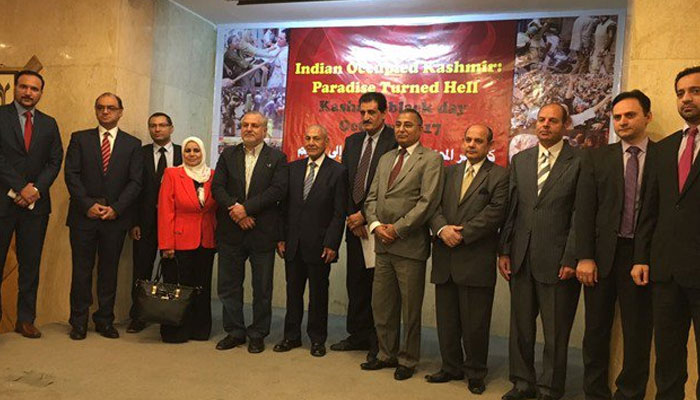Kashmir Black Day observed in Egypt
CAIRO: The Pakistan Embassy in Cairo observed Kashmir Black Day on its premises to commemorate the 72-year history of landing of the Indian occupation forces in Jammu and Kashmir and to highlight the illegal occupation and continuous human rights violations there.
A large number of intellectuals, journalists, students, members of Pakistan-Egypt Friendship Association and Pakistani community notables attended the event. Three short documentaries focused on the recent developments in the Indian Occupied Kashmir were screened on the occasion.
The students of Pakistan International School of Cairo (PISC) presented a tableau, portraying the suffering of Kashmiris. A student of Al-Azhar University, Adil Mahmoud, read out a poem on Kashmir with Urdu translation.
President of the Egyptian-Pakistani Friendship Association Ambassador Fathi Yousuf stressed that escalation of tension in the region as a result of India’s decision to abolish Kashmir's special autonomous status posed a threat to regional peace and security.
He called on India to listen to the voice of wisdom and urged the Muslim countries to extend all support to the people of Kashmir in the face of Indian repression. Prominent journalist and Deputy Chief Editor of Al-Gamhouri Sayed El-Hany stressed that the Kashmir struggle, recognized by several resolutions of the UN Security Council, was legitimate and not terrorism and that it was India that had ignored the UNSC resolutions on Kashmiris’ right to self-determination and also the OIC resolutions calling for sending a fact-finding mission to the IOK.
Strategic analyst Maj. Gen. Gamal Mazloum talked about the scenarios of future events in the light of fresh Indian escalation and warned against military confrontation between the two nuclear countries.
Director Farabi Center for Studies Professor Medhat Hammad expressed belief that resistance was the option left for the people of Kashmir, as India continued to ignore the resolutions of international legitimacy and forcibly suppress the Kashmiri people.
Professor Ibrahim Muhammad Ibrahim of Al-Azhar University decried India’s insistence to deprive the people of Kashmir of their right to freedom and self-determination as guaranteed by the Charter of the United Nations to all peoples. He stressed the importance of the media role in publicizing the just cause of Kashmiris in light of the Indian media's control of several media channels.
South Asia expert Samir Hussain said India's recent escalation in the IOK was part of the economic struggle among world powers over promising economic development axes in light of the Pakistan-China partnership in the economic corridor which was an important part of the Silk Road revival project.
He stressed that the jihad of Kashmiri people complied with the relevant UN resolutions, which affirmed their inalienable right to self-determination and which India continued to dodge. Highlighting the historical background of the struggle, the Ambassador of Pakistan to Egypt Mushtaq Ali Shah said the unconstitutional and illegal changes in the status of the IOK by the Indian government would herald the decisive phase of struggle of Kashmiri people; however, its full impact would be visible only after lifting of curfew clamped down by India for more than 80 days. He said neither would the people capitulate to repression nor would Pakistan abandon the cause of its Kashmiri brethren.
-
 Blac Chyna Reveals Her New Approach To Love, Healing After Recent Heartbreak
Blac Chyna Reveals Her New Approach To Love, Healing After Recent Heartbreak -
 Royal Family's Approach To Deal With Andrew Finally Revealed
Royal Family's Approach To Deal With Andrew Finally Revealed -
 Super Bowl Weekend Deals Blow To 'Melania' Documentary's Box Office
Super Bowl Weekend Deals Blow To 'Melania' Documentary's Box Office -
 Meghan Markle Shares Glitzy Clips From Fifteen Percent Pledge Gala
Meghan Markle Shares Glitzy Clips From Fifteen Percent Pledge Gala -
 Melissa Jon Hart Explains Rare Reason Behind Not Revisting Old Roles
Melissa Jon Hart Explains Rare Reason Behind Not Revisting Old Roles -
 Meghan Markle Eyeing On ‘Queen’ As Ultimate Goal
Meghan Markle Eyeing On ‘Queen’ As Ultimate Goal -
 Kate Middleton Insists She Would Never Undermine Queen Camilla
Kate Middleton Insists She Would Never Undermine Queen Camilla -
 Japan Elects Takaichi As First Woman Prime Minister After Sweeping Vote
Japan Elects Takaichi As First Woman Prime Minister After Sweeping Vote -
 King Charles 'terrified' Andrew's Scandal Will End His Reign
King Charles 'terrified' Andrew's Scandal Will End His Reign -
 Winter Olympics 2026: Lindsey Vonn’s Olympic Comeback Ends In Devastating Downhill Crash
Winter Olympics 2026: Lindsey Vonn’s Olympic Comeback Ends In Devastating Downhill Crash -
 Adrien Brody Opens Up About His Football Fandom Amid '2026 Super Bowl'
Adrien Brody Opens Up About His Football Fandom Amid '2026 Super Bowl' -
 Barbra Streisand's Obsession With Cloning Revealed
Barbra Streisand's Obsession With Cloning Revealed -
 What Did Olivia Colman Tell Her Husband About Her Gender?
What Did Olivia Colman Tell Her Husband About Her Gender? -
 'We Were Deceived': Noam Chomsky's Wife Regrets Epstein Association
'We Were Deceived': Noam Chomsky's Wife Regrets Epstein Association -
 Patriots' WAGs Slam Cardi B Amid Plans For Super Bowl Party: She Is 'attention-seeker'
Patriots' WAGs Slam Cardi B Amid Plans For Super Bowl Party: She Is 'attention-seeker' -
 Martha Stewart On Surviving Rigorous Times Amid Upcoming Memoir Release
Martha Stewart On Surviving Rigorous Times Amid Upcoming Memoir Release




